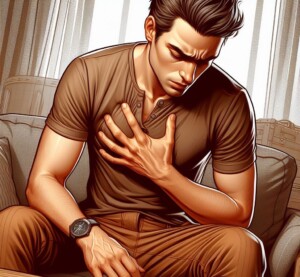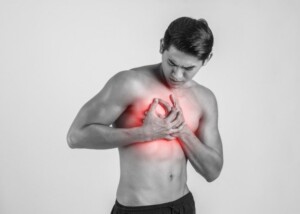
GERD and costochondritis (“costo”) both cause pain in the chest.
Both can cause enough chest pain to make a person think they’re having a heart attack.
But there are also differences between the chest pain of gastroesophageal reflux disease and costochondritis.
“Gastroesophageal reflux disease typically can cause heartburn, burning discomfort in the chest associated with eating, regurgitation or a sour taste in the back of the mouth,” says Dr. Neil Sengupta, MD, a general gastroenterologist and assistant professor at the University of Chicago, and GI Research Foundation Scholars Award Recipient.
The GERD discomfort in the chest often will have a mildly abrasive feel to it if it’s not outright burning. It often immediately gets worse when you lie down.
When it’s not associated with eating (stress/anxiety and a weak esophageal sphincter can bring on acid reflux), the chest discomfort is, as mentioned, often made worse immediately after lying on your back – and is relieved or at least not as bad when you sit back up.
GERD or acid reflux symptoms will not feel worse if you press on the area of discomfort.
“Costochondritis is typically caused by inflammation in the junction between the ribs joining the cartilage that holds them to the sternum,” continues Dr. Sengupta.
This can be precipitated by heavy workouts at the gym, but costochondritis has other causes as well such as severe coughing, a blow to the chest area, rheumatoid arthritis and cancer.
“The pain is localized to the chest overlying the bones/cartilage and can often be reproduced by palpation,” says Dr. Sengupta.
So if you press on the area with your fingertips, you should be able to evoke pain.
“Pain related to costochondritis is typically not related to eating and does not respond to acid blocking medications such as proton pump inhibitors.”
The pain of costochondritis is usually on the left side of the chest and, for some patients, can be described as aching, while others say it’s sharp or like a heavy pressure.
Though costo doesn’t cause a burning sensation, keep in mind that not all episodes of GERD or acid reflux cause a burning sensation, either.
GERD sufferers have reported aching, pressure and just plain pain in the chest in the absence of any diagnosed cardiac or other cause.
If you’re experiencing any of these symptoms and have not seen a doctor, the first thing you’ll want to do is visit a cardiologist to rule out a serious heart condition.
CANCER
Heart conditions far more commonly cause chest pain than do cancers.
Here is a list of cancers that may cause chest pain.
 Dr. Sengupta’s research interests involve optimizing the care and outcomes of patients hospitalized with gastrointestinal bleeding. Specific interests include GERD, colon cancer screening and fatty liver disease.
Dr. Sengupta’s research interests involve optimizing the care and outcomes of patients hospitalized with gastrointestinal bleeding. Specific interests include GERD, colon cancer screening and fatty liver disease.
 Lorra Garrick has been covering medical, fitness and cybersecurity topics for many years, having written thousands of articles for print magazines and websites, including as a ghostwriter. She’s also a former ACE-certified personal trainer.
Lorra Garrick has been covering medical, fitness and cybersecurity topics for many years, having written thousands of articles for print magazines and websites, including as a ghostwriter. She’s also a former ACE-certified personal trainer.
.


























